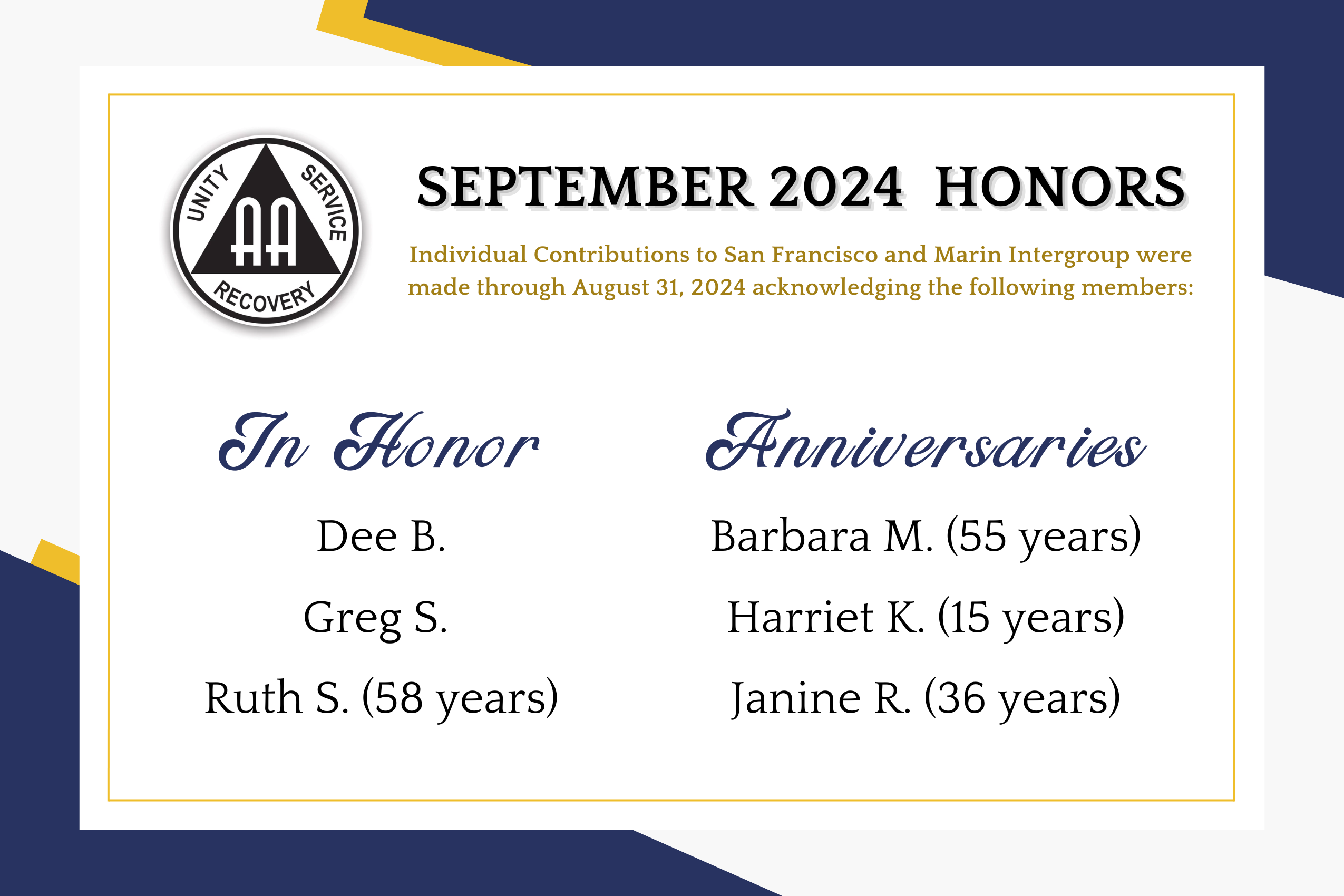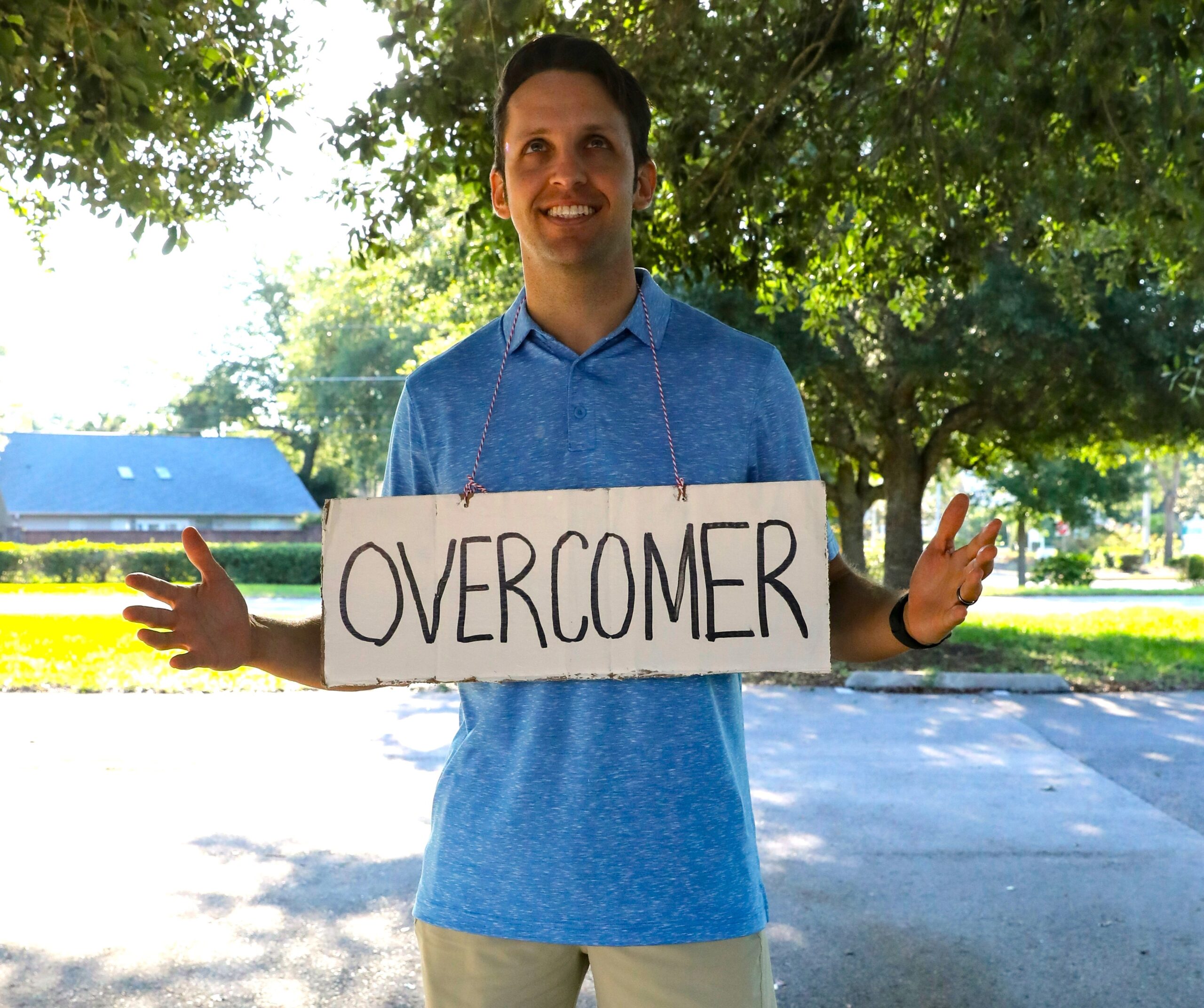September 2024 Honors


By Rick R.
In my early months of sobriety, I was asked, a few days in advance, to lead one of my first meetings. At that time, My EGO was already taking control of this new phase of my life, and of course, I immediately wanted to let everyone know just how enlightened I had become in such a short period of time. In our little meeting room, we didn’t have a lot of upper end furniture. Someone donated two rows of old theater seats and they were arranged one behind the other. I seated myself in the center of the front row. I went through all the preliminaries we went through and when it came time to select a topic, I decided to impress everyone and announced the topic to be SELF PITY, for we all know that it is, as stated in the Big Book, the biggest Killer in A.A. We had a lady named Helen B. who always announced herself as “A tough old broad”, and she was. Unfortunately for me, she was seated in the row behind me. When I finished my sentence, she leaned over and shouted in my right ear, loud enough for everyone in the room to hear. “YOU’RE FULL OF S—-, RESENTMENTS ARE THE BIGGEST KILLER IN A.A.” and she was right. She gave me a resentment and I wanted to kill her. LOL. It was humiliating.
I grew to love Helen for what she did to my ego, what I couldn’t do to it myself at the time. (B.B. Pg. 64, Resentment is the “number one” offender. It destroys more alcoholics than anything else.) One of the things I took away from that little embarrassing experience was that I better know what I’m talking about before I open my mouth. Another thing that came with those little course corrections, was a drive to understand why I do the things I do. If I am still judging others, Gossiping, Rationalizing, Selfish, etc. My EGO is still in control. A friend in the program once stated that: All forms of criticism and Character Assassination stem from Low Self-esteem and my thoughts were: Who Me??? From that day on I have stopped those EGO driven behaviors and I replaced them with Patience, Empathy and Compassion and Understanding.
I now live by the dictates of my Conscience. Most of the progress that I’ve experienced in the A.A. program wasn’t as difficult as it seemed, when I was going through it, but it took a lot longer to have the structure in place, such as honesty, patience, understanding, unselfishness, and so on, to support each level of growth. Intellectually, resentment was one of the things that I could understand, but with all the complicated mental defenses I had bouncing around in my head, my best efforts only produced slow but steady progress. Most of the resentment issues I had while I was still drinking were usually more of the façade I created with my sick mind. When I got sober, my relation was real and even then, I, with the help of my ego, had a hard time accepting the day-to-day interfacing with other people. Does all this mean that I must take abuse from others in my circle of friends? I always thought there was a conflict of values, like “turn the other cheek” or something like that. Well, I found out through trial and error that we, in the A.A. program, are closely related to more people than the average person out there, and we come to know the personality traits and I am not threatened by them anymore. The People that know me, Know me Well.
And it all started with a loving kick in the Butt from a “tough old broad” named Helen B. God bless her. To this day, I thank Helen for setting me straight.

By: Dede H.
There’s a special spiritual charm
In chanting ten thousand names
Of God or of a Holy Mother
In Its myriad of energetic forms
In some countries it is a norm
We now know indeed it’s true
Everything is a part of the One
See words are an entire ocean
Each one a name that is too
Describing bubbles in the sun
How many words are there?
In the history of the world?
Perhaps a quadrillion or more
Maybe every word is sacred
Every single word we share
What is the lesson here?
What can I discern from this?
Speak mindfully and clear
Talk gently to remain in bliss
Open hearts keep You near

By Anon.
I was intrigued by the organization of this meeting I had been “invited” to attend. The secretary seemed to take no notes, created no Minutes, and there appeared to be no real agenda, just people talking and chiming in from all over the place. Her aide, the guy at her right, in the seat of honor and power, or so I had surmised, said and did nothing the entire hour – that was the job I would try to land for sure. If I had to attend these meetings to try to keep “she who must be obeyed” (my wife) off my back, then the easiest job available had my name written all over it.
Of course the reality of the “not drinking part,” the purpose of these meetings, was lost on me, and caused me to continue to sink deeper and deeper into my disease. When that changed, thanks to an actual miracle of sobriety, in every sense of the word, months later, through no fault or action of my own, except daily 7:00 a.m. meetings, it began to dawn on me how clueless I was in those first few days about how meetings really worked. As the sober days began to pile up into years, I saw how trusted servants volunteered their time, sometimes at a sponsor’s subtle elbow or nod, to help make things happen every day, 365 times a year, rain or shine. I was even told how, on the morning of 9/11 when the horrors of the Twin Towers and elsewhere were being told in real time the meeting continued, after a brief Group Conscience. After all, sober men and women deal with tragedy a bit better than those not, at least so seems the belief.
In my own recovery I took hard the lesson that if the man to whom the Twelfth Step efforts were directed did not “get it,” we were to move on to the next still-suffering alcoholic. This seemed so hard to me as I read those words in the Big Book. Its authors had recovered. They told us how they did it. They shared their stories, some quite vivid and desperate, promising no matter how far down the scale we might have gone, our experience could help another. So why would we leave the one who did not “get it” behind? Why would we, how could we, abandon even that one? The story of the shepherd going to any lengths to save one sheep astray from the flock was a reverberating counterpoint.
But it was I who did not get it.
As time passed, I realized those who seemed to make it did so because of something within them, something driving them to survive. No one was able to instill that drive within me and I realized I could likewise not instill it in the next man. He or she had to want it all on their own. I could only carry the message. Not make him or her hear it, not make them follow it, not make them live it. So too it seemed with those meetings I attended.
While my Home Group has not changed, often my schedule gives me other alternatives. I have found that those meetings where I “want what they have” all seem to have that same sense of a drive to survive. They seem compelled to do the next right thing as a group to keep their attraction alive.That is not because they just have the best array of cookies or a variety of organic teas, although rigorous honesty demands the acknowledgment I do not find them to be detractions. But it means they have a sense of purpose palatable to me. Hands are quick to be raised for help with cleaning up or grab an open commitment. The awkward silence of waiting for a volunteer, if present, is short. Also, the people in those rooms seem to exude genuine caring, many might call it love for those about them, Particularly ones who might be suffering, whether with just 24 hours or decades of sobriety. They realize that living life on life’s terms is not always easy and awareness is evident in how they participate in the meeting. That attraction is infectious to me. I seek out those meetings. I return to them. I survive because of them.
I have come to believe they survive because of the same reasons I was drawn to the program in the beginning. Their members share the exact same reality I experienced – that to drink is to die. They know, truly, that the statistics are against the alcoholic’s victory over their disease. So, in the same way for me: Life Depends On It. I see too the life and longevity of a meeting depends on living this reality, one meeting at a time.

By Jay F.
September is upon us here in San Francisco, and that means a change in the seasons as we transition from the summer fog (“Fogust?”) to more balmy weather. Of course, “balmy” to us is relative, just ask someone in Texas this time of year! September is also the ninth month of the year, and when us AAer’s turn our attention to step nine. This step is also about change, a change in our attitude and outlook on life.
When I was first exposed to the twelve steps of Alcoholics Anonymous, they seemed strange indeed. All the mentions of God, prayer, and inventory did not have much to do with quitting drinking as far as I could tell. At this early stage of recovery, I was still running the show, so I had not yet surrendered. Sound familiar?
I was in residential treatment at the time, and my fellow residents and I were making the rounds of the local AA meetings. We heard members share about working the steps and when they would share about making amends to those they had harmed, fear set in among us. We would talk amongst ourselves back at the house about how scary that was and if we could even do such a thing. I started going over in my mind the people I had harmed because of my drinking and just how scary it would be to make amends to them. I still did not see what this had to do with quitting drinking, but my attitude would soon change.
When I got home from treatment and started to go to meetings on my own, the ninth step still loomed large. When I heard it read at meetings I cringed in fear. I got a sponsor and started working the steps, dreading number nine the whole time. My sponsor cautioned me not to look ahead and to focus on the step we were working on, reminding me they were in order for a reason. When we got to step eight, we looked back on the inventory from step four to make a list of all the persons I had harmed. With the help of my sponsor, I went through the list thoroughly to determine those to whom I would make amends. So, when we got to step nine, I was ready.
I set about making amends to people and the reaction was overwhelmingly positive. This was a cathartic process for me, and I felt a tremendous weight lift from my shoulders. Practicing humility and taking responsibility freed me from the guilt and shame which so often leads to relapse. I finally saw what it had to do with my not drinking!
If I continue to practice humility and accept my part in things the promises can come true, and I will be amazed before they are halfway through.

By the time I was even able
to consider making an amend,
he was long buried, my insults
and transgressions with him.
How could those wrongs ever
be addressed, a letter read
over a cold tombstone seemed
the best alternative.
The brilliance of the option
then suggested was lost on me
when heard. But I had asked
this one for help for a reason.
They had already walked this path
and helped others like me.
Not only did their idea make
sense, they had not been wrong yet.
So, into their eyes I spoke of the
past about which I had such regret.
In those eyes of the living, I was able
to gaze into The Eyes Of The Dead.
Not to etched granite in green lea did I
make this amend, but to a living, breathing
person. Someone who could feel the harm,
share the hurt I had inflicted before.
I could say what needed to be said, knowing
it fell not on deaf ears. Into those eyes
I looked, seeing neither the forgiveness nor the
understanding which were not theirs to give.
In these mirrors to my soul, I saw instead the peace
which comes from a task well done, I saw instead the
freedom which comes from an amend well made, I saw
instead what it means to fearlessly work the steps.
John R. Wallace
08/23/2024
Dedicated to Barbara C. – She of the Brilliant Idea

By: Christine R.
“What’s your sign?” was the great pick-up line in my day. To keep the patter going, we all knew our Zodiac signs. Like I understood a thing or two, I would tell you in deep cabernet intonations, “Triple Scorpio and proud of it.” Today in AA when I think of signs, what comes to mind are our old-fashioned, beat up, 8 by 12 laminated posters scattered around the walls of my home group, the Cabin. Inscribed in some sort of Edwardian script, they take a while for newcomers’ blurred eyes to home in on, much less comprehend their intent.
But For The Grace Of God, One Day At A Time, Easy Does It1. How could any of these save a person from drinking? Little by little, each sign has come to enter my heart in ways both wonderful and miraculous. I love, “But For The Grace Of God.” Grace is defined as an undeserved gift. Because I go with, “If it were about justice, I’d be dead,” I know grace, that undeserved gift, brought sobriety and keeps me sober today.
One Day At A Time. So helpful when we want to be well by yesterday. Realizing life truly is lived one day at a time, Easy Does It comes naturally. We can relax and take it easy. When traveling two miles into a forest, it takes two miles to return. With many years of drinking behind us, it takes a while for healing to take place. We look for progress not perfection.2
Now we come to another sign not previously listed. An important one, always found in meetings, is the Exit sign. In my newcomer days, the Exit sign was by my best friend. By sitting in the back of the room, looking for the Exit sign usually posted next to a big clock on the wall, I could figure out when to leave early thanks to that sign.
With time, as with so many things in AA, the Exit sign proves to be one of our more valuable assets. Through this vehicle we take the principles we learn out into the world. It is not enough to hole up in AA meetings. Our program flourishes when we move forward and outward.
We form our future on the foundational principles of the Program. The cornerstone and the keystone are building blocks for a better tomorrow. “Upon this simple cornerstone a wonderfully effective spiritual structure can be built.3 With the keystone in place we create “the new and triumphant arch through which we pass to freedom at last.”4
The Exit sign comes to mean more than arriving late and leaving early. Initially my seat was near the Exit sign to leave early. Now this cat bird seat allows me to follow that early-leaving newcomer out into the parking lot for some good, old-fashioned fellowship – another sign this individual is loved and cared for; a lifeline to not leave in a huff but to stay the course.
The last person to leave discovers opportunities to take on more signs, like signing up for set-up, clean up, or greeter. By signing up, we find more chances to share our experience strength and hope with newcomers. Alone no longer, we can travel through the Exit together. Now that’s a Great Sign!

By Anon.
Having done a thorough Step 8 when I first got sober and worked the steps (At least to the best of my ability at the time, which my Sponsor anointed with his solemn approval), I had that experience in the spiritual tool kit I was filling up for the days to follow. Step 10 of course kept me on track as sober days became years, so I thought of Step 8 more as a memory, or in the abstract at meetings, something to hone for use with a sponsee down the road.
However, when the challenges of life on life’s terms hit like a tsunami, abstract thinking, memories, or my idea of what’s good for you, were washed away in the torrent of the “storm” confronted. As instructed, I sought to determine what Step(s) applied to the circumstances at hand. My sponsor, that thorough I want “what he has” kind of guy, of course reminded me that Step 4, the Step to which I was pointed to assist on the arc of life which I was trudging, required a searching and fearless moral inventory. With earnestness he added that failure to fully perform Step 4 lead many guys with more days than I back to the bottle. This was not an attractive alternative at all.
With my new 4th Step inventory completed, I moved through the admissions trice and took the book down from the shelf, which itself had yielded unexpected and marvelous results. To this HP I was now experiencing in a new and wondrous way, I was able to ask that my defects be removed. With all I could muster, I was even willing to make this request straight from my heart and with complete abandon, as rigorous honesty now demands my witness. But the Big Book seems to never let AAers rest on their laurels, its authors knew a drunk like me was in trouble if I did. Instead I was called to more action.
Now I had to make a list of “All Persons We Had Harmed.” Since that “ancient history” had been done and my recent episodes “promptly admitted,” as the effect of now requesting my defects be removed sank in, I had to ask – Whom had I harmed by the expression of these defects this time?
The answer was unexpected, as it was “Me.” Here I was, Making a List, and the first name on it was mine. My sponsor assured me this was not a hidden manifestation of ego, but rather an honest appraisal of the results of my inventory. For while I had developed resentments towards those on my inventory, thanks to my HP and my fellow AAers, I had not acted out upon those resentments. But I sure let them eat me alive. While I had not taken actions which I regretted or which called for an amend to another, I waxed profusely and profanely in the privacy of my own mind.
I riddled my HP with questions, demanded He conjure up favorable responses to my plightsand, perhaps the saddest of all, denied myself the reality, and worse, my willingness to accept, He had all of these circumstances under control. I forgot I was in His care, an actor on His stage, a worker amongst workers in His field. As this realization was made exact during my Step 5, the reflections suggested by Step 6 revealed it was my shortcomings, my inability to trust my HP, which required attention and change; which demanded I ask them to be removed. To change, I needed to be willing and then humbly ask for the help needed. In that reflection I also saw whom I had “hurt” in the expression of this shortcoming, who needed to be on my Eighth Step List – Me.
Into “the mirror” which my sponsor “held” to assist my perception, I looked at me. I could now see and begin to appreciate just how destructive my thinking and the patterns created had been on me, why I owed “me” an amend. I may not have lashed out at another [thank goodness] as I had fretted with my issues, but I sure beat myself to a pulp. I did not like the circumstances, but I found I had begun to accept them as they were. Whether mine was to be a tragedy or a comedy, only my Director knew. But as my play of life unfolded, my lines now came more freely for I had through this Step 8 begun my living amend to “Me.”

By Jay F.
I remember when I read the Big Book of Alcoholics Anonymous for the first time and came across the Twelve Steps listed in Chapter Five. Looking down the list of Steps one stood out to me, Step Nine: “Made direct amends to such people wherever possible, except when to do so would injure them or others.” All the other Steps seemed a bit esoteric, but the Ninth Step was one of action. People I knew in early recovery were dreading the fact they had to make direct amends to people. Not this alcoholic.
For what would I need to make amends? Wasn’t I the one who was harmed by drinking? I never stole money, drank on the job, or anything as horrible as other people had done. In my mind I had not harmed anyone, my actions were “victimless crimes.”
They say the Steps are in order for a reason, and my experience proves this to be true. Before we can make amends in the Ninth step, we must first work Step Eight: “Made a list of all persons we had harmed and became willing to make amends to them all.” With the help of my first sponsor, I set out to make the list, and there were quite a few people on it! I soon realized that I did in fact harm others during my drinking career and needed to make amends for my behavior.
My life up to that point had been one of constant lying and pursuing my obsession to drink to the detriment of those around me. This was especially true to the people closest to me, most notably my immediate family. They figured prominently on my list. The selfish notion that I was the only victim proved false as we went through this Step thoroughly and honestly. I will add that going through the list with my sponsor was critical, as his experience, strength, and hope helped to guide me.
My sponsor also stressed that the key word in this Step is “willing.” As we went through the list, he kept reminding me that I must be willing to make these amends for the promises to come true. If I was not yet willing, then I should make conscious contact with my higher power and summon the willingness. As it says in the Spiritual Experience Appendix II in the Big Book: “Willingness, honesty, and open-mindedness are the essentials of recovery.” He was fond of pointing out that “everything is in the book,” which seems so obvious all these years later!
So, list in hand and willingness in my heart I completed Step Eight and was ready to make amends. Any fear I had about approaching people to take responsibility for my actions was gone.By making a list of all the people I had harmed I was holding myself accountable and became willing to look at my part. This was but one step towards my journey to live a life as a sober man and practice the principles of AA in all my affairs. The Twelve Steps are truly a design for living that really works if we are willing to do the work.
Notifications